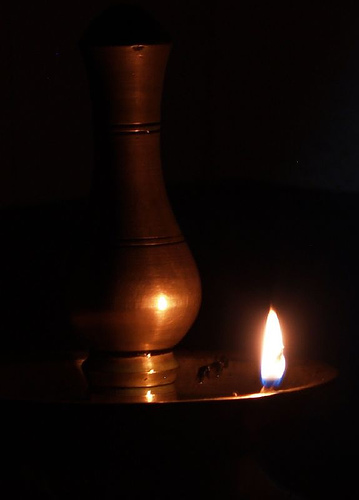A discourse about the
parayanam would be able to exist without the
practice itself existing. A discourse would still be able to transact
'knowledge' about parayanams, since it has represented the essentials
of the parayanam. This reminds one of the insistence of the Stoics that
regions of philosophy such as ethics and logic were actually regions of
philosophical discourse, and not of the mode of philosophical life.
'Ethics' and 'logic' are conceptual areas, but philosophy itself had to
be lived, not read or written.
There might come a point when discourse comes to stand in for, to take over practice. At this point, they who possess the discourse will ‘know’ more about the practice than the practitioners themselves! But, in criticizing this, does one mean that only practitioners can speak about practices? No. Rather, it suggests than even they cannot produce a discourse about practices.
What does the arrival of a discursive impulse do to traditional cultures? Does it overwhelm them? Do traditional cultures resist? The transformations in the practice of the recitation of the Ramayanam are noted here.
Here is where we have to confront a significant question. If, as has been discussed, discourses cannot capture the embodied nature of practices, what are we doing? How can we possibly talk about or write about practices? Discourses affirm and nourish universities. Most of the information, let alone the theories, produced in universities are irrelevant as far as traditions themselves are concerned.
As a first step, we have to ask whether we can think of new questions and new ways of asking them; whether we can fashion this difference mode of inquiry. These practices are instances of different ways of being in the world. Academic writing can only affirm one specific existence. Can these practices bring forth elsewhere, in our case, in the university, other creations, other performances, other modes of being? Can the university foster such productions? Can the university become another space?
This project is a tentative attempt at such a production. It attempts to bring together different voices and different styles of recitation that form the tradition of the Ramayanaparayanam in Kerala.
There might come a point when discourse comes to stand in for, to take over practice. At this point, they who possess the discourse will ‘know’ more about the practice than the practitioners themselves! But, in criticizing this, does one mean that only practitioners can speak about practices? No. Rather, it suggests than even they cannot produce a discourse about practices.
What does the arrival of a discursive impulse do to traditional cultures? Does it overwhelm them? Do traditional cultures resist? The transformations in the practice of the recitation of the Ramayanam are noted here.
Here is where we have to confront a significant question. If, as has been discussed, discourses cannot capture the embodied nature of practices, what are we doing? How can we possibly talk about or write about practices? Discourses affirm and nourish universities. Most of the information, let alone the theories, produced in universities are irrelevant as far as traditions themselves are concerned.
As a first step, we have to ask whether we can think of new questions and new ways of asking them; whether we can fashion this difference mode of inquiry. These practices are instances of different ways of being in the world. Academic writing can only affirm one specific existence. Can these practices bring forth elsewhere, in our case, in the university, other creations, other performances, other modes of being? Can the university foster such productions? Can the university become another space?
This project is a tentative attempt at such a production. It attempts to bring together different voices and different styles of recitation that form the tradition of the Ramayanaparayanam in Kerala.
